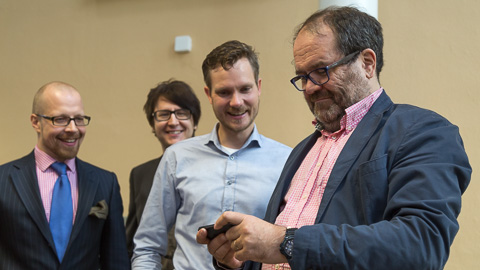Hooking Games Can Be Helpful in Mental Health Rehabilitation
The new research project, Play for Reward, of the multidisciplinary game research network of the University of Turku studies the emotional hook of entertainment gaming and its utilisation in the rehabilitation of patients suffering from brain damage. In addition, the project maps out the possibilities of health games from the point of view of business and the reform of health care services.

Professor of Psychiatry Jyrki Korkeila is trying out the Benji Bananas Adventures mobile game at the press conference of the new project with the assistance of CEO Torulf Jernström of Tribeflame Ltd, which is the business partner in the venture. Standing on the left are the project’s Director Aki Koponen and Project Manager Jukka Vahlo.
Play for Reward research project has been initiated at the University of Turku and it combines medicine, psychology, economic science and game research. The goal is to discover how entertainment games can be utilised as a treatment and with what kind of operation models the verified effectiveness can be put to use in the development of rehabilitation services. The research has three different parts.
‒ First, we will study what kind of feelings the players experience while playing their favourite games and how the playing hooks. Second, we will research how the hooking game experience can be used in the development of rehabilitation services. Finally, we will research what kind of business prospects this operation has, tells Project Manager Jukka Vahlo from the Centre for Collaborative Research of Turku School of Economics which coordinates the project.
Hooking Is Essential
Professor of Psychiatry Jyrki Korkeila is in charge of the research which studies how gaming can be utilised in the rehabilitation of the brain. The subjects are patients who have suffered brain damage.
‒ Brain damages were selected as the research topic as they can be defined precisely. We know what kind of symptoms damage in a certain area causes. Damages impact, for example, coordination and can cause changes in personality, such as impulsiveness and depression, apathy, lack in motivation and in the ability to feel pleasure, lists Korkeila.
As a result of an earlier research, the researchers know that a hooking game experience can have positive effects on the brain.
‒ The goal is to develop a game that is suitable for the rehabilitation of certain kinds of brain damages and pleases the players and encourages them to continue. At this point, it looks like the game’s level of difficulty has to increase gradually and it must require some kind of a strategy. So that the effects are positive, the game also has to offer feedback to the players and reward them for success.
When considering playing as a form of rehabilitation, it is important that the playing is controlled. If playing is too excessive, the brain will be in an overactive state. Half an hour of gaming time will develop the flexibility of the brain which has been reduced by the brain damage.
‒ We will carry out a clinical trial in the Play for Reward project, which will research the effectiveness of the game treatment method compared with regular rehabilitation.
Market for the Health Games Is Taking Shape
In the economic section of the project, the researchers study the business prospects for health games. The potential is great as different kinds of games are very popular. According to earlier research, a typical western youth plays video games for over 10,000 hours before the 21st year, for instance. The average age of gamers has surpassed 35 years and there are nearly as many female gamers as male.
‒ People invest an enormous amount of time and energy in their favourite games. So that we can utilise this potential in health care, we need research about the games’ effectiveness: this has to work, this has to be cost-effective. We will find out what kind of actors our ecosystem is missing so that the representative of health care industry and the offerer of the game can create a service. This requires broadmindedness in organising welfare services, says project’s Director Aki Koponen from the Centre for Collaborative Research.
The University of Turku’s Play for Reward research project is ongoing until the end of 2015. A continuation is planned for the project as a part of the Up Your Game research network which is supported by the City of Turku. The project is led from the Centre for Collaborative Research of Turku School of Economics of the University of Turku, the task of which is to initiate innovative research projects which are multidisciplinary and socially influential.
Play for Reward research is funded by Tekes, entertainment game company Tribeflame, serious game company GoodLife Technology, provider of information systems to the health care sector BCB Medical as well as Validia Rehabilitation of the Finnish Association of People with Disabilities and Orton Rehabilitation.
Text: Taru Suhonen
Photos: Hanna Oksanen
Translation: Mari Ratia